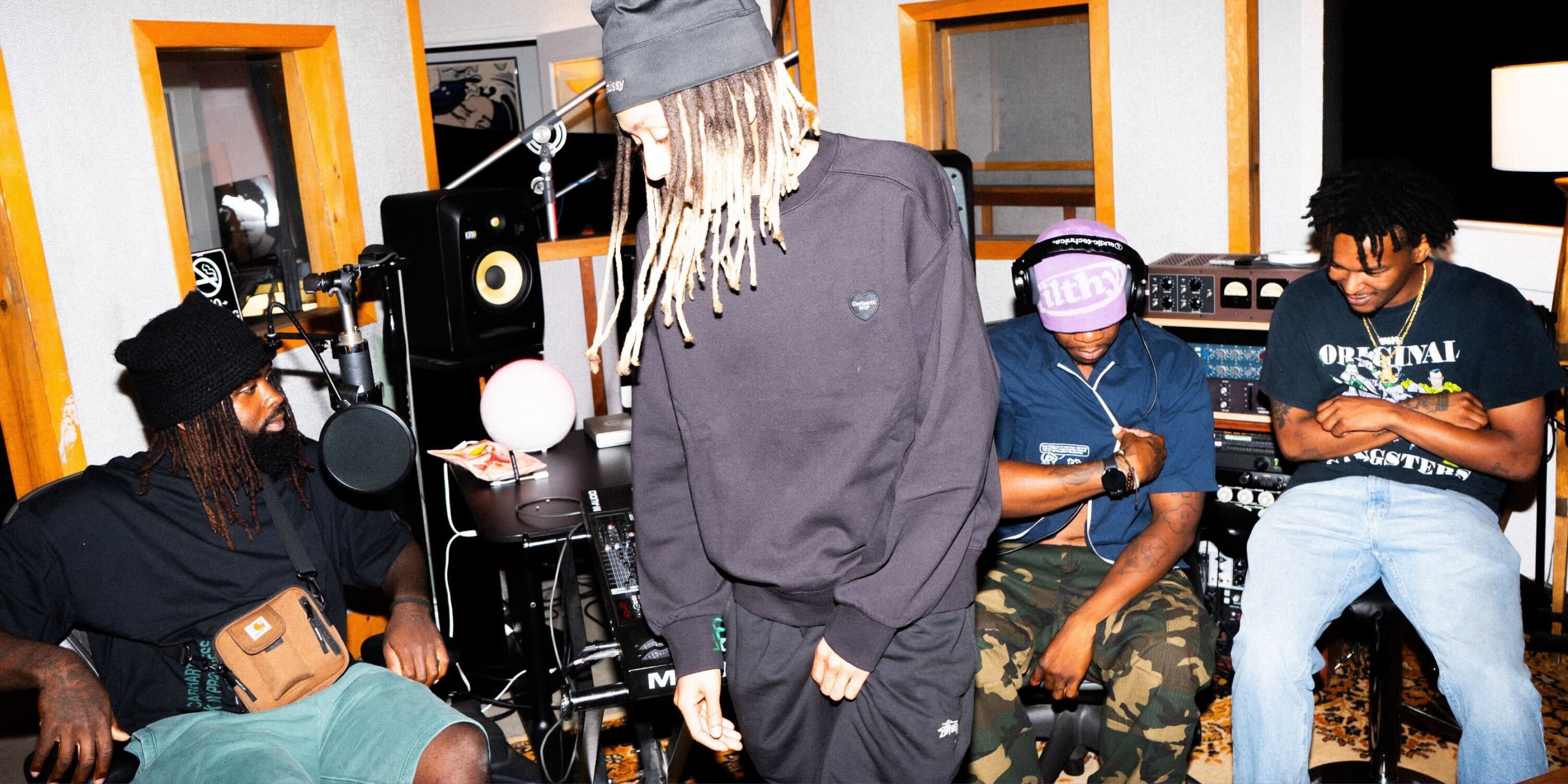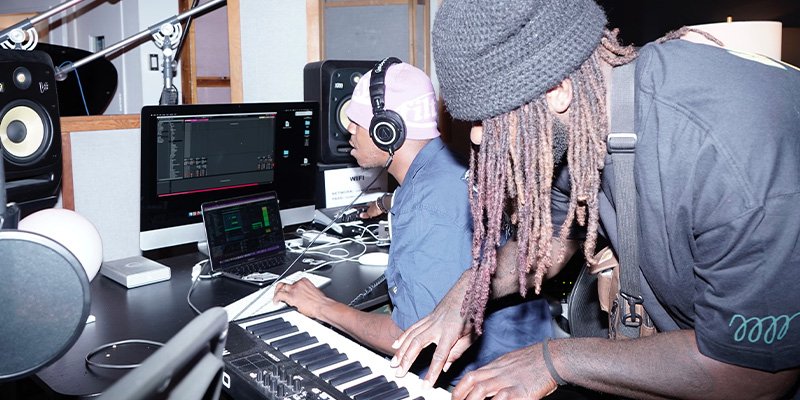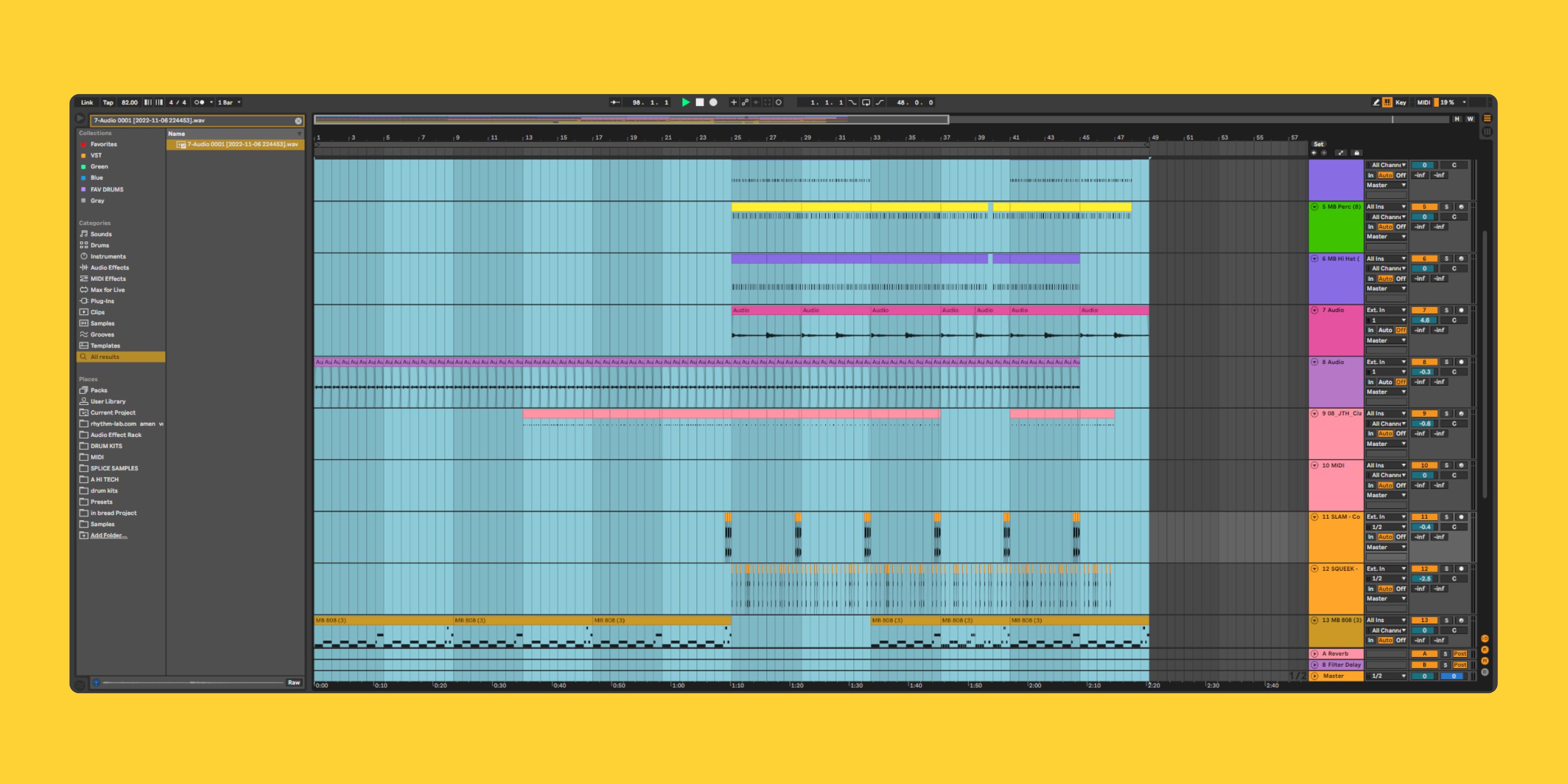HiTech: Reinventing Ghettotech

Bound by their techno roots and call-and-response rap phraseology, Detroit-bred HiTech is a collaboration between producers and vocalists King Milo, Milf Melly and DJ 47Chops. Despite their individualized takes on Motor City culture, they held a shared desire to create a new blueprint for the gritty ghettotech sub-genre and spent 2021 circulating a compilation of tracks burned onto 15 CDs – one of which found its way to techno and house maverick Omar S, leading to the release of HiTech’s self-titled debut album on FXHE in 2022.
Their second album, DÉTWAT, has also been reverberating in the clubs since its release this year, and the LP sees HiTech fuel their sound with seeds of booty tech, footwork, rap and Detroit jit to produce an exhilarating blend of revved-up 808s, pulsing bass and warped, catchy vocal treatments. Here, King Milo discusses his intuitive approach to production, based on feel rather than studious technical precision. Not that you’d notice – DÉTWAT’s skilfully raucous party sound has already seen HiTech hailed as one of the most groundbreaking acts to come out of Detroit for years.
Did Detroit techno’s cultural history and the whole Atkins, May, Saunderson axis have an influence on HiTech to begin with?
Yeah, for sure they did, plus folks like Omar S, things I heard on the radio and just being here in Detroit. They played a lot of local stuff, which obviously includes the pioneers, but a lot of things that Detroit techno had influenced too. That was vibes for me coming up. I heard the people you mentioned as a kid at family functions and such, but I’m not the history guy – DJ 47Chops is the one who fills me in on that. I’m 100% in the present – everything I put together is coming off of feels and things I’ve experienced coming up here in Detroit and Ypsilanti, where I was raised.
How and when did HiTech combine as a trio and was that based purely on friendship or a realization that you had a network of skills that you could combine?
I’m not gonna lie, it started off as a happy accident. Milf Melly and I got together because we were tired of making the same kind of music. We were making rap and hip hop but thought – let’s make something core. We didn’t say, let’s make techno, we wanted to make what we were feeling, so we made a lot of vibes, increased the BPM and started making very chaotic drum patterns. We knew what we were doing, but there was no intention behind it. Then 47Chops came in and was feeling it the same way we did. He thought the sound was coming together and, being the history guy, knew what else we needed to be playing with. We only made 15 CDs, but Omar S picked up on one of those and the rest is history.
So then you were tapped by Omar S’s FXHE label?
It was like this: I hadn’t heard about Omar, but he’s one of those people in the city that you gotta know about. The first tape had already been out for a year and Omar didn’t get it until the end of that year and we didn’t think anything of it. Then when people started gravitating towards what we were doing we had to take a second look at things. 47Chops was spinning for Omar at one of his events and I guess he relayed one of those CDs to him. So Omar’s cruising around in his GTR listening to it and was truly rocking. We just needed to put a little more intention behind what we were doing, but Omar gave us the reins to hit the floor and start running.
You wanted to deconstruct traditional club music, which implies you had a goal beyond making straight-up techno – is that right?
I never wanted to go about making music in a traditional way. Like I said, I was rapping a lot before, and still do that now – that’s the point of the hybrid style of music we’re making, but I was just trying to create something that everybody could digest and transition ghettotech to the next sound. A lot of people like to do whatever’s hot, but we were trying to reinvent something and it happened to be techno. When Omar S told us to make stuff with a little more intention, I took that formula and merged it with what Milf Melly was doing and how Chops envisioned things. It just so happens that we’re all like minded.
What elements of techno, rap or club music did you feel could be identified and enhanced?
With dance music in general, some people will say there is a statement in there that makes it important. It’s about the beat, the type of instruments you use and filling a space. When you hear a dance beat, a soft 808 is pumping and after four or eight counts you start hearing the clap, every single step or sound in the track matters. It’s imperative to control people’s emotions. That’s what I get out of making dance music – filling that space and understanding how I’m going to make somebody’s body tick and make them flow.
How important is the message?
The beat is very important in rap, but the point of hip hop is the message, so when you rap you have to have a message. Not everybody has to relate to it, but when you’re saying something, you’re speaking to somebody. ‘Statement music’ is what I like to call it – the outside of it being ghettotech, booty tech or just techno, you feel me? My purpose in terms of being able to control my message is to release people from their inhibitions, free flow everything and make people feel like their life is changing for the better. Those are the elements that we’re putting our power behind.
Techno music is often closely associated with specific hardware, whether that’s a TR-808 or a DR-55 drum machine. Did you ever attach importance to the physical relationship between man and machine?
I was part of another group a while back and we used that sort of equipment all the time. Everything was analog and we tried to do as much as we could, but nowadays I just get on the computer and use my Push and M-Audio Oxygen Pro. We got a voice transformer, which I play around with, but that’s pretty much it.
We’ll have friends come over and they’ll bring some equipment and play, or we’ll go to Omar’s or a studio out of the state and session there. We did one recently with Black Noise in New York. They’re great people, they gave us a lot of room to just play around with analog equipment, including stuff I’d never seen. If anyone starts naming off numbers, I don’t know what they’re talking about – I just get on it, play it, learn it and maximize it. I don’t really care to understand because I go thoroughly off feeling. I’m not on auto pilot, but it’s always about emotion.

HiTech’s King Milo and Milf Melly in the studio
As a trio, do you tend to bring equal ideas to the table and substitute for each other?
All of that. Milf Melly is an innovator – the one thing I learned from him is how to forward my sound. I am the present, Chops is the past and Milf Melly is the future; I’m just trying to amalgamate my skills and vibe from these guys while teaching them everything that I know, but I’m probably the only engineer in the group. I mix the tracks, master them to the best of my ability and produce too. The boys also produce or DJ and I’m learning that from them, so we’re all trying to interweave and involve each other as much as we can while throwing our own thing into the mix.
When you say interweave, does that mean file sharing?
We file share, but try not to if we can help it. We get our best cook-ups when we all sit in the same room, brainstorm and throw out ideas. That will normally start with me running some drums off and playing some chords or Melly putting some stems in Google Drive and saying, look, I just did this. At that point, we’re contorting drums and samples and flipping everything – it’s kind of crazy! We try to be live and organic as much as possible, so we’ll have a guitarist come in or I’ll try to get somebody to play drums, or make a weird noise or vocal. Personally, I don’t really like making loops or samples, but if somebody can only send me live drum samples then I’ll switch things up.
Can you give us an example of how you might make music in an organic setting?
For the track “ZOOTED,” I produced the whole thing with the help of a friend named $quid who was here to influence the energy. There were six of us in the room, so I was feeling the vibe and the energy and just started pushing on the table until everything’s shaking to the beat. I cut on the mic and turned that thing all the way up until it was hot as hell, and then I’m slamming the table. We put that on the beat until it’s almost acting like a drum in a way that was damn near four-to-the-floor. I put a little reverb on it and we end up with organized chaos, but you feel it. Basically, the mic picks up all the energy in the room.

King Milo: “A lot of homemade cuts and samples were used for ZOOTED – a lot of banging on tables, clapping, pushing on tables and a lot of noises. The track is 100% original; no additional samples were used outside of the vocal samples we recorded ourselves at home. We used a couple of different synths including some drum cuts from the Ableton stock, but we do a lot of kit work to make sure it all sounds organic and very closely knit.”
To get that raw energy across on record, do sounds need to be left alone?
I like a clean sound, but not too clean, because that makes everything sound linear. Some people I work with are used to that squeaky clean sound and wanna sound like Beyoncé. No disrespect to Beyoncé because I can’t wait to get her on one of our tracks, but if it’s too clean and controlled it will sound just like everything else. People can tell when something is genuine and when it’s not, but I need it to sound real.
In a more technical setting, do you have set routines in terms of how you might construct a track from the ground up?
Because I’m very hands-on, I rarely use Session View. Even when I’m using analog, I’ll pull up the Arrangement View and lay it down like that. I’ll start with drums and make sure the BPMs are at a good speed so people can vibe, which is anywhere between 145 and 180. I start from the top, then go to the bottom and start filling up the gaps. Either that or we’ll run with some samples from Melly or Chops, swap and distort sounds or Melly will speak into the mic and we’ll just flip it.
Can you tell us a little about your vocal treatments? They seem to be more like snapshots than traditional rap vocals.
‘Snapshots’ is kinda lit. I’m trying to figure if I wanna give you the floor to say that, but I feel where you’re coming from so I don't want to take that from you. When the beat drops and the full statement is being said it’s like a release – the last minute of meditation before you exhale. It’s all about the importance and power of the statement and how it’s perceived. Space is super important, so vocals have to be perfectly placed and feel like gravity. Sometimes I’ll write for a vocalist, other times I’ll let them vibe it out and do as many takes as they need to provoke an emotion. If it resonates, we’ll rock with it and then max it out as much as we can. I’m trusted with the art of chopping vocals up and putting everything together to make it make sense, but we got to make sure the person spitting it feels the vibe and it’s not fake. No fraud, no fake, no iffy energy. It has to be some real Detroit shit, to be specific.
What’s the message behind HiTech’s sound?
We try to talk about stuff that’s actually going on in our lives right now. One thing I learned about hip hop is, no matter what it is, make it sound cool. I’m sure you heard our song “WHYYOUFUGGMYOPPS” – it’s about this girl cheating on me with somebody I really did not respect. She knew that, but did it intentionally. People gravitate to that song because the energy is true. When people relate, you got a ball of energy with a casing of fire around it that inflates everything and sets it off. Everything we’re talking about is personal – we just gotta act it out so people can feel like they’re there. Confidence is key and bravado is a facade for those who don’t do the work.
Follow HiTech on Bandcamp and their website.
Text and interview: Danny Turner
Photos courtesy of the artist.